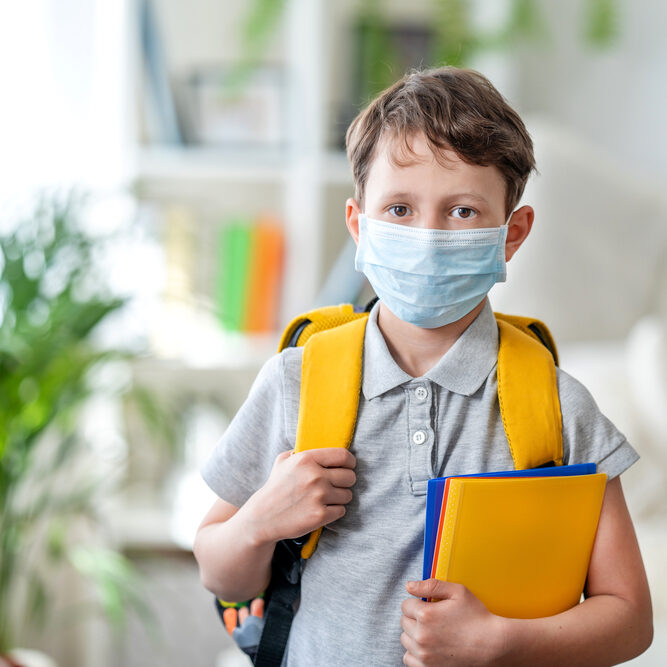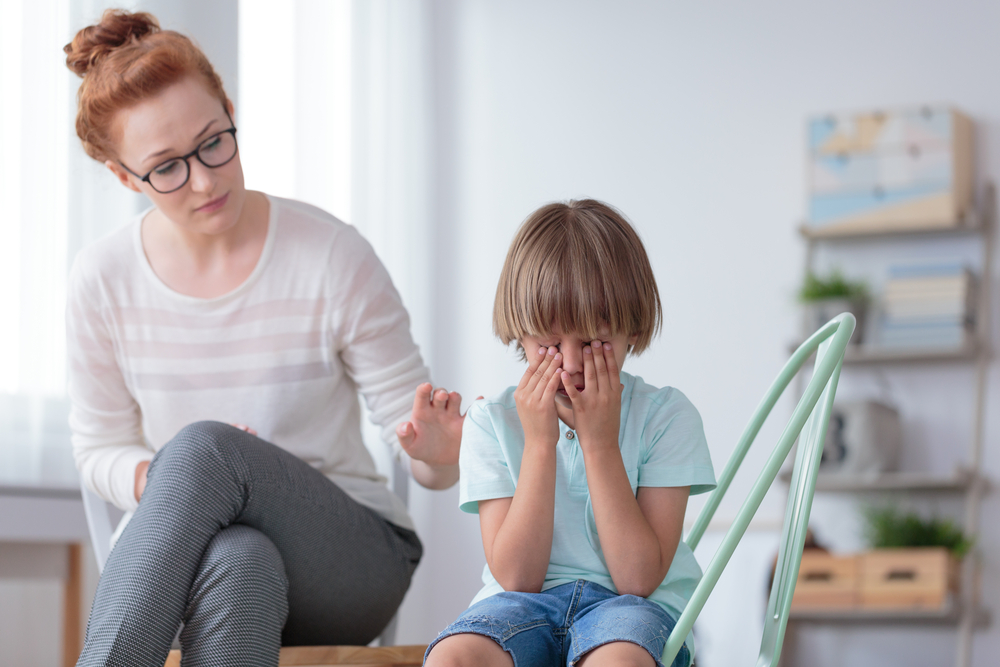The COVID-19 pandemic has brought drastic changes to our daily lives, leaving children particularly vulnerable to the stressors of the pandemic. The pandemic has disrupted their routines, social connections, and has caused anxiety and stress for some children, leading to negative impacts on their mental health. As schools reopen, it is important to address the anxiety that children may experience while returning to school, as it can have lasting impacts on their mental health and academic performance.
What is the impact and why is addressing anxiety important?
The pandemic has led to increased experiences of stress, anxiety, and depression for children. In addition to the closure of schools and limited social interaction during the pandemic, some children also experienced stress related to financial instability in their families. The lack of social interactions and support for children has led to an increase in loneliness, which has been linked to long-term impacts on their mental health.
As schools reopen, children may experience anxiety about returning to school, particularly if they have been learning from home for an extended period. It is essential to address this anxiety and provide support to help children transition back to school. This can be done by providing mental health support, creating a positive and supportive school environment, and ensuring that children have access to resources to manage their anxiety. Addressing anxiety in children can lead to better academic performance and long-term mental health outcomes. In conclusion, it is critical to prioritize the mental health of children and provide support to help them transition back to school successfully.
Understanding Anxiety in Children
Anxiety is a feeling of unease, worry, or fear that can be experienced by anyone, including children. Anxiety symptoms can be physical, emotional, or behavioral. Physical symptoms may include rapid heartbeat, sweating, and restlessness. Emotional symptoms may include feelings of dread, irritability, or nervousness. Behavioral symptoms may include avoidance or refusal to participate in activities or social situations. Anxiety can manifest in different ways, and it is important for parents and caregivers to recognize these symptoms and seek appropriate treatment.
Common Triggers of Anxiety in Children Returning To School After the Pandemic
As schools begin to reopen, some children may experience anxiety related to returning to the classroom. Common triggers of anxiety in these situations may include fear of getting sick, fear of socializing with peers after a long period of isolation, fear of not being able to keep up with academic expectations, fear of being away from parents or caregivers after spending an extended period of time together, and more. Parents and caregivers can help children cope with these anxieties by providing reassurance, maintaining open communication, and seeking professional help if necessary.
Strategies for Parents to Help Kids with Anxiety
-
Creating a routine and structure at home
-
Encouraging open communication and active listening
-
Practicing relaxation techniques with children
Creating a routine and structure at home
One of the crucial strategies that parents can use to assist their children with anxiety is to establish a routine and structure at home. Children find comfort in knowing what to expect every day, and a well-established routine can help them feel grounded and less anxious. Parents can create a schedule for their children that includes time for homework, play, meals, and relaxation. They can also provide their children with a sense of predictability by sticking to the schedule as much as possible.
Encouraging open communication and active listening
Another strategy for parents to help their children with anxiety is to encourage open communication and active listening. Parents need to create an environment where their children feel comfortable sharing their feelings and emotions. They can ask their children open-ended questions about their experiences and listen attentively to their responses. When children are anxious, they need to feel understood, and parents can provide that by actively listening to their concerns and validating their feelings. Check out our Instagram page for more information about active listening skills, or book an appointment with a therapist of your choice to learn more.
Practicing relaxation techniques with children
Finally, parents can help their children with anxiety by practicing relaxation techniques with them. Relaxation techniques like deep breathing, visualization, and progressive muscle relaxation can help children calm down when they are feeling anxious. Parents can teach their children these techniques and practice them together regularly. This can be a helpful tool for children to use when they are feeling overwhelmed or anxious. Additionally, parents can model relaxation techniques themselves, showing their children how to manage their own stress levels effectively.
Strategies for Teachers to Help Students with Anxiety
-
Creating a safe and supportive classroom environment
-
Providing clear and consistent expectations
-
Offering opportunities for socialization and peer support
Creating a safe and supportive classroom environment
One of the most important things a teacher can do to help students with anxiety is to create a safe and supportive classroom environment. This can be done by ensuring that the classroom is a welcoming and inclusive space where all students feel valued and respected. Teachers can also make sure that students feel comfortable sharing their thoughts and feelings, and that they have access to resources and support if they need it.
Providing clear and consistent expectations
Another important strategy for helping students with anxiety is to provide clear and consistent expectations. This can help to reduce uncertainty and provide students with a sense of structure and routine. Teachers can do this by establishing clear rules and routines, communicating expectations clearly and consistently, and providing regular feedback and support.
Offering opportunities for socialization and peer support
Finally, offering opportunities for socialization and peer support can also be an effective way to help students with anxiety. This can be done by encouraging students to work together on group projects, providing opportunities for students to share their thoughts and feelings with one another, and creating a supportive and inclusive classroom community. By fostering a sense of connection and belonging, teachers can help students to feel less anxious and more engaged in their learning.
Professional Support for Children with Anxiety
It is important to recognize when a child’s anxiety is interfering with their daily life. Signs that professional help may be necessary include excessive worry, avoidance of certain situations, physical symptoms such as headaches or stomachaches, and difficulty sleeping. If a child’s anxiety is affecting their ability to function in school or at home, it may be time to seek professional support.
Overview of therapy and counseling options for children
There are several therapy and counseling options available for children with anxiety. Cognitive-behavioral therapy (CBT) is a common treatment that helps children learn to identify and change negative thought patterns. Play therapy is a form of therapy that uses play to help children express their emotions and learn coping strategies. Family therapy can also be beneficial, as it involves the entire family in the treatment process and can improve communication and support.
Importance of involving parents and teachers in the treatment process
Parents and teachers play a crucial role in supporting children with anxiety. They can provide valuable information about the child’s behavior and help identify triggers for their anxiety. Involving parents and teachers in the treatment process can also improve the child’s outcomes, as it ensures that everyone is working together to support the child’s needs. It is important for parents and teachers to be aware of the child’s treatment plan and to provide ongoing support and encouragement. Keep in mind, your involvement in your child’s treatment is often on the child’s terms. It is important to respect your child’s decisions and provide them with the autonomy to take charge of their own treatment.
To Summarize…
Recap of the importance of addressing anxiety in children returning to school after the pandemic
As the world slowly recovers from the pandemic, children are returning to school with mixed emotions. Some are excited to see their friends and teachers again, while others feel anxious and overwhelmed. Therefore, it is crucial for parents, teachers, and mental health professionals to recognize the importance of addressing anxiety in children as they return to school. Anxiety can have a significant impact on a child’s academic performance, social interactions, and overall mental health. By acknowledging and addressing their concerns, we can help them feel more comfortable and confident in their return to school.
Encouragement for parents, teachers, and professionals to work together to support children’s mental health.
To support children’s mental health, it is essential for parents, teachers, and mental health professionals to work together. Parents can talk to their children about their concerns and provide reassurance and support. Teachers can create a safe and welcoming environment in the classroom and be mindful of the signs of anxiety in their students. Mental health professionals can provide additional support and resources for children who need it. By working together, we can ensure that children have the tools and resources they need to cope with anxiety and thrive in the classroom. We must prioritize mental health and well-being, especially during these challenging times, to help children succeed academically, socially, and emotionally.
If you or someone you know is looking to begin online therapy and you reside in Ontario, Canada, please do not hesitate to contact us at admin@evergreentherapeutics.ca. We offer a team of psychotherapists who treat a variety of mental health concerns with individuals, couples, and families. Visit our website www.evergreentherapeutics.ca for more information.





